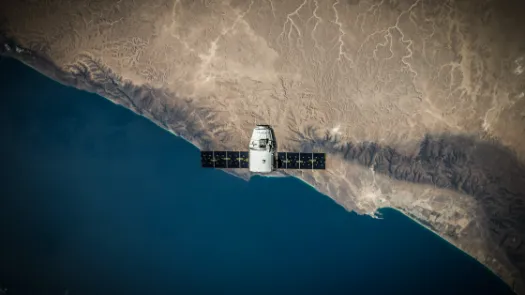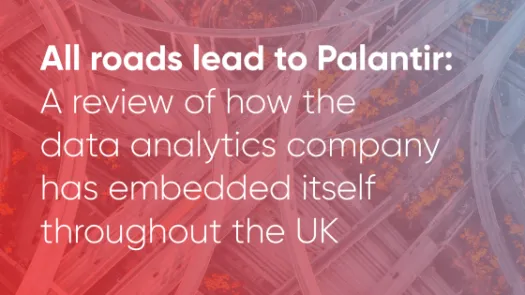Challenging the Militarisation of Tech
War and conflict must not dominate our societies and technologies.
Photo by Sebastian Piedoux on Flickr
We all want a future where our families, friends, and communities can thrive — one rooted in justice, democracy, with social and political stability.
But instead of heading toward that future, we’re being dragged into a new kind of arms race.
Governments and companies around the world are fighting to establish their dominance - plunging us into a ‘tech race’ that is redefining the battlefield and blurring the line between civilian and military infrastructures. This dramatic shift is affecting everything around us, reshaping our future, and radically changing the priorities of politics and investment.
We are being pushed into a militarised future we don’t want.
This phenomena is visible in many forms:
- States bringing military technologies into our town squares by establishing partnerships with the “defence technology” industry - militarisation of civilian spaces.
- Civilian technology companies encroaching on battlefields, taking civilian data with them - militarisation of civilian tech.
- Private investment firms and funds pushing unimaginable amounts of money, creating incentives for surveillance and war, and serving investors before people – a privatisation of military tech.
The battlefield is coming to our towns and cities, as technologies that we rely on every day are militarised. In turn, civilian technologies driven by our data and our lives, are moving onto the battlefield. The very same companies who build tools of war are expanding to deliver civilian infrastructure, and vice versa.
But it doesn’t have to be this way. We can stop governments and these companies from feeding our data into these war machines. We need technology that is developed for us, in our interests and the interests of our families and communities, not the interests of profit.
The drivers of tech militarisation
- Industry
Governments are increasingly dependent on the private sector for delivering public services and functions. From the health sector to the defence sector, governments are outsourcing their statutory obligations to private firms through public-private partnerships. This dependency is creating huge opportunities for private firms - the range of which has now exploded, with a huge new set of actors looking to get in on the action.
Commercial companies - such as Google and other Big tech giants - want what defence companies have: a wider margin for manoeuvre in developing and testing new technologies. And defence companies want what commerical companies have: access to larger and more diverse pools of data - our educational records, our biometrics, our health data, our lives. For both, militarisation has the potential to massively expand their profits – but at the cost of our future.
- Geopolitics
Regulation and policies intended to restrain government or industry use of technologies and data - meant to protect us - are being thrown away, creating a race to secure dominance on the world stage. An arms race of technological dependency is taking place all over the world.
Tech has never been more important:
- From China’s ‘Digital Silk Road’ - exporting surveillance technologies, data laws, and cyber governance models to countries including Myanmar before and after the junta took control of the country;
- To Russia using private military groups, notably the Russian-born Wagner Group as proxy vehicles to establish their influence across the African continent;
- To Israel using Palestine as a laboratory to test and export its technologies that further conflict and destruction in other parts of the world, such as South Sudan;
- To European aid and development programmes being redirected to drive border externalisation policies expanding surveillance capabilities globally; and many more.
Technology is becoming a tool in the arsenal of world powers playing geopolitical games.
- Defence spending
Defence budgets are being diverted on an immense scale toward defence and surveillance technologies, as national defence budgets increase dramatically. The US has increased its defence budget for 2025 to almost $850 billion. Similarly, the UK has announced substantial increases in defence spending, funded by deep cuts to foreign aid, redirecting £6 billion per year.
In parallel, venture capital and these new start-ups – often referred to as ‘defence-tech’ – are pushing the Pentagon and other militaries around the world to adopt ‘innovation’, with the sole aim of gaining profit and waging war. These investment vehicles encounter no scrutiny, no democratic accountability, and have no concern for human rights. In turn, scrutinising and challenging repressive tech will become even more difficult for civil society.
With this rush of money has come a rush of big tech companies looking to capitalise - ditching their promises not to build AI for surveillance or war. As governments are seeking to integrate buzzword technologies like ‘automation’ and ‘AI’ into their national defence strategies and civilian infrastructure - private companies are looking to sell.
Why does this matter?
The militarisation of tech undermines the democratic rule of law and human rights by enabling unchecked government power, leading to repression and abuse. We have seen in authoritarian regimes the world over that these practices are used as tools to control and manipulate people, silencing freedom of speech, and inhibiting democratic processes - it’s disturbing to see these practices being mirrored by democratic governments. Yet companies are seeking to scale these technologies to as many markets, and contexts as they can.
This new wave of technology is coming, and fast. They will inflame an already fragile environment for the protection of rights and the rule of law across the world.
- Attack on privacy. This involves vast accumulation and exploitation of people’s data in both the public square and the battlefield, which is then used to generate more systems that monitor and target more people more invasively.
- Attack on accountability. These new waves of surveillance technology are often deployed in secret with limited oversight and without appropriate rules to constrain or regulate their use. This, combined with the increasing dependence on private sector, has led to a lack of transparency over the development and use of these systems, undermining our ability to prevent or discover abuses, or to seek justice.
- Attack on opinion. These new systems, and the threat of the data being accumulated to support these systems, will stifle speech, dissent, protest, and other aspects of healthy democratic life: a new chilling effect.
- Attack on community. The lack of oversight can lead to abusive surveillance practices, such as the targeting of marginalised groups, giving rise to further discrimination and social inequality. Some communities may be targeted for their data, which in turn may be used to teach learning systems for adoption in other contexts.
What we have been doing about it?
Since our founding we’ve been monitoring problematic new technologies, tracking surveillance firms, and calling out governments’ secret surveillance capacities - this is us in Jan 1999.
We have been exposing:
- the industry’s journey across the boundaries of defence to civilian applications.
- We followed Palantir as it moved from national security to migration and finally, to public health;
- Clearview AI from policing to ultimately being deployed for defence in Ukraine; and more.
- instances where new technologies are rolled out and tested in precarious situations, putting people at risk.
- We researched the deployment of biometrics against groups of people, including victims of war, asylum seekers, refugees, or people on the move, with hardly any legal frameworks, oversight or remedies; and more.
We have been working with others, acting together to:
- to explore the risks of and potential safeguards for tech within humanitarian contexts alongside organisations operating in conflict contexts and humanitarian organisations, such as with the ICRC;
- to draw attention to authoritarian tech deployed around the world, and track the flow of surveillance technologies into our partners’ countries;
- to uncover the public-private partnerships that drive surveillance alongside our partners across the world; and more.
We have been advocating:
- against the drivers of the militarisation of surveillance, such as the global counter-terrorism agenda and border externalisation policies advocating for stronger human rights protections;
- before national and international bodies to raise the human rights concerns in militarisation and put pressure on states to take steps to protect people’s privacy; and more.
What we’re doing now
This wave of militarisation of tech requires immediate intervention if we are to shape the next decades’ technological landscape and ensure our freedom and dignity are protected.
In blurring the lines between military and civilian, there is a serious risk that tech developed in one context will be transferred to the other without due consideration of the different rules of engagement. We risk allowing both sectors to take advantage of gaps in regulation and oversight on either side. This results in more exploitation, greater concentration of power, and fewer restraints - pushing militarisation ever onward.
We must understand what new harms appear when governments, the defence tech industry and private investors align their interests: Who are the key actors driving these phenomena? How does the data-intensive character of existing surveillance and security tech business models impact the development and deployment of emerging defence technologies?
This project aims bring together key strategic partners to answer these questions, and to defend our future.
We are:
- Building a joint robust knowledge base through extensive learning and exchanges with others to identify key gaps, risks, and concerns;
- Developing new approaches and momentum for change based on this body of knowledge to counter disturbing developments and influence public discourse around the militarisation of tech; and
- Identifying new effective advocacy strategies, working together to compel these governments and companies to change their behaviours.
Together we will stem this tide, and ensure that war and conflict do not dominate our societies and technologies.






